September 2022: Olive Tree

Volume VII/Issue 6/September 2022


From The Editorial Desk
Thoughts During Sede Vacante
"Sedevacantism" is a theological position embraced by traditionalist Catholics which holds that the Papal See is vacant. The term "sedevacantism" is derived from the Latin phrase sede vacante, which literally means "while the seat is vacant," the seat in question being that of the Papal See. After the death or resignation of a pope, the Holy See enters a period of sede vacante. The most recent period of sede vacante of the Holy See began on 2 August 2022, after the death of Pope Michael.
Modern sedevacantism owes its origins to the rejection of the theological and disciplinary changes implemented following the Second Vatican Council (1962–1965).
Sedevacantists thus rejected the Council which they saw as contradicting the traditional teachings of the Catholic Church and as denying the unique mission of Catholicism as the one true religion, outside of which it there is no salvation.
Sedevacantists believe that the infallible Magisterium of the Catholic Church could not have decreed the changes made in the name of the Second Vatican Council, and thus they have concluded that those who issued these changes cannot have been acting with the authority of the Catholic Church.
These changes were so "radical" from their perspective that they seriously deviated from church tradition. They argue that most pre-Conciliar Catholic theologians and canon lawyers taught that it is inherently impossible for a heretic to hold the papal office. Additionally, particular provisions of Church law prevent a heretic from being elected or remaining as pope. Paul IV's Bull Cum ex apostolatus officio stipulated that a heretic cannot be elected Pope, while Canon 188.4 of the 1917 Code of Canon Law provides that a cleric who publicly defects from the Catholic faith automatically loses any office that he holds in the Church.
In response to this sad situation, a monumental effort was undertaken in the previous century to provide the Church with a Pope faithful to the unchanging teaching of the magisterium. This effort, by the grace of God, came to fruition on 16 July 1990 with the election of David Bawden, who took the name Pope Michael.
Though we now sojourn without the directing voice and action of our visible head, the very Vicar of Christ, the Church is not left orphaned or destitute. During the time of the vacancy of the Papacy, our Lord Jesus Christ remains as ever the Head of His Church, and His divine grace still flows into the world and into the souls of those who avail themselves of it.
"Seek ye therefore first the kingdom of God, and his justice, and all these things shall be added unto you. Be not therefore solicitous for tomorrow; for the morrow will be solicitous for itself."
To God be the glory always!

The Catholic Caregiver
By Brother Stephen
First and foremost, we begin with prayer – for prayer is oxygen to the soul and without it we will not grow into unity with God. A common caregiver’s prayer includes these words: “Heavenly Father, help me better understand and believe I can do what you ask me to do.” The prayer then asks for forgiveness when I question God’s judgement…give me energy, understanding, strength, patience, wisdom, laughter…and finally closes with, “Remain my constant companion as I face the challenges of caregiving and when my job is through and it’s time for me to let go, help me remember my loved one is leaving my loving arms to enter your eternal embrace. Amen”
What is a “Catholic Caregiver”? How does he or she differ from other caregivers? Does this difference make any impact on the Caregiver as well as the one to whom care is given?
A Catholic is one who believes in what the Catholic Church has always taught, at all times, and in all places. A Catholic prays: “O My God I firmly believe that Thou art One God in three Divine persons; Father, Son, and Holy Ghost, and that Thy only begotten Son became man, died for our sins, and will come again to judge the living and the dead. I believe these and all the truths which Thy Holy Catholic Church teaches because Thou hast revealed them who can neither deceive nor be deceived.” The Catholic identity includes not only a specific belief system which includes the sacraments, proper worship of God, the communion of Saints, the forgiveness of sins, the acceptance of Holy Scripture and Tradition as being divine guides in life, but also a very elaborate system of moral theology. A Catholic can be said to have orthodox belief and orthopraxis practice. Simply put, not everyone is Catholic, indeed there might only be a small number of Catholics on earth today. It can be said without contradiction: Not all Caregiver’s are Catholics. It can be argued that all Catholics should be Caregivers. So, who is a Caregiver?
In simple terms, a Caregiver is a person who tends to the needs or concerns of a person with short- or long-term limitations due to illness, injury or disability. The term “family caregiver” describes individuals who care for members of their family of origin, but also refers to those who care for their family of choice. This could be members of their congregation, neighbors or close friends. An added definition might include an individual, such as a physician, nurse, or social worker, who assists in the identification, prevention, or treatment of an illness or disability.
What we have defined as a Catholic Caregiver would combine the identity of a Catholic with the role of a Caregiver. A physician, nurse or medical provider can be Catholic, or not, but in can be argued that all Catholics should be caregivers at one time or another in their lifetime as a result of not only natural circumstances but also circumstances subject to the operation of Grace. Remember, that Grace builds upon nature and never destroys it. We see that the natural gifts of the physician being perfected by the actual graces obtained by being also a Catholic. Not so with secular non-Catholics, for they operate on the natural plane only. Nature in itself is a gift from God - so that “all is Grace”.
The important point is that all Catholics should at some point be a caregiver by definition. The Catholic Caregiver operates under the assumption that he is caring for a human being with a body and soul destined for heaven or hell. The Catholic believes, and so acts upon that belief, in the distinction between body and soul and sees the integral connection between the two animated by the Spirit of the Creator. The Catholic therefore cares for the human being in his entire composite nature – not simply as a bundle of material requirements but as a person with a body and a soul created in the image of God.
The history of Catholic Caregiving is replete with examples of extraordinary Saints: Saint Luke the Physician, Saints Cosmas and Damien healers of bodies and souls, Saint Camille De Lillis, and Saint Damian of Molokai. These were Catholic Caregivers in the extraordinary sense. The history of institutional care in hospitals begins with the Catholic model in the early Middle Ages. It has been, and always will be, the Catholic model of institutional Care that is the only model capable of serving the needs of body and soul. True care consists in meeting both the needs of the body as well as the soul. That is the true difference between Catholic Caregiving and Non-Catholic (secular) Caregiving. The true care of the soul rests with the Church working through its clergy and laypeople. Being a member of The Mystical Body of Christ enhances caregiving to a higher transcendent level. The manner, as well as the end of the caregiving, are different for the Catholic Caregiver. This difference will be felt by the one being cared for as well as those involved in the effort to heal the sick, or to assist those in dying.
A new commandment I give unto you: That you love one another, as I have loved you, that you also love one another.” (John 15:12)
What is more to the point is that the Master and Healer, Our Lord, directs his disciples to heal the sick. The command to love one’s neighbor – the command to love one another as He has loved us – that command leads us all to be caregivers wherever and whenever we meet with those who need our help along the way in life. Our Lord cared for the body as well as the soul. His Church is the same yesterday, today and tomorrow.
“And these signs shall follow them that believe…they shall lay their hands upon the sick, and they shall recover” (Mark 16, 18).
It is within the family unit that most Catholic Caregivers will meet their challenges, that life proposes, by the mystery of suffering. Suffering is a condition of human existence, and our Faith teaches us that when we offer up our suffering in sacrifice united with Christ - suffering can be redemptive. Without our Faith suffering can be made part of hell on earth. We can see that suffering can bring upon the soul graces and perfection when it is viewed in this sacrificial aspect. We are, almost in contradiction, also commanded to relieve suffering when it comes to others. The Catholic Caregiver at home seeks to relieve the suffering of his family member and in so doing often participates in suffering as well. One must always remember that although suffering is part of the human condition, we must never seek it but rather accept it as we would our own cross given to us by God on the way to our cavalry. We are given the cross and we do not select our own. On the way to our own calvary we will meet those along the way in need of water, of food, of shelter, or assistance with a medical, mental or spiritual problem. We are all commanded to assist – to love - and we do not have to be medical providers to do so. The Catholic Caregiver will bring the help he is capable of bringing imbued by actual graces, and he will also offer the prayers he and his loved one will need to carry on. The soul of the caregiver, and the recipient of the care, are thereby graced by the faith of the Catholic.
All the pain and suffering will be redeemed by the intervention of Our Lord and Lady. Think of the death of Saint Joseph and one can picture Jesus and Mary at his bedside – caring for him and loving him to the end. The Catholic Caregiver offers similar solace and comfort to his family member, especially in those last days if it is the will of God that the body not recover . We will be successful as caregivers if we emulate the Holy Family – and in the end Our Lord and Lady, and Saint Joseph will be there for us – caregiving to our souls in ways that we could not do on our own.
“His mother said to the servants, “Do whatever he tells you.” (John 2:5)
The soul of the Catholic Caregiver will be made more perfect in his work as caregiver. The soul of the one cared for will be made more perfect as a result of care given by a Catholic. Caregiving in the strict sense without the direction of Our Lord and His Church end in alleviating only the needs of the body. The needs of the soul are never met and therefore what remains solely in the flesh dies. The differences between secular and Catholic Caregiving echo in eternity. All Catholics will be caregivers at some point in their lives – better to be prepared to do so than unprepared or recalcitrant. We do not choose our Crosses they are given to us.

A Eulogy for His Holiness
In the name of The Father, and The Son, and The Holy Ghost
“Naked came I out of my mother’s womb, and naked shall I return thither: the Lord gave, and the Lord hath taken away; blessed be the name of the Lord.” (Job)
Reverend Father, The Family, Friends – Brothers and Sisters in Christ
I am Brother Stephen, tonsured to the clerical state by his Holiness in September of 2018, here to share with you a few words about our dearly departed brother, friend, pastor and much more. First, and foremost, we start with the language of our Holy Mother the Church:
“Requiem aeternam dona ei, Domine. Et Lux Perpetua luceat ei. Requiescat in pace. Amen. Eternal rest grant unto him, O lord. And let perpetual light shine upon him. May he rest in peace. Amen”
The world has tried to convince us that our loved ones who have departed from this life live only in our memories. To some extent this is only a half-truth – they do live in our memories. I am sure David will live in our memories: Memories of a loyal and dear son, a caring brother, a priest, a community leader. Indeed, he will live on in each of us in this way. But when we go to rest ourselves those memories will go with us and sadly, after just a few generations, the memories fade and all are eventually forgotten. Does that mean David no longer will live? A famous line from Hamlet summed it all up: “He was a man, take him for all in all, I shall not look upon his like again.”
Our Faith teaches us – not so. I will ask you to consider the difference between nature and grace. They are very different, but we can say also that grace always builds upon nature - and never destroys it.
In David’s life on earth, we had examples of natural talents and virtues: He was ever so patient in his teachings and dealings with people. He also displayed a very particular manner of humility, and as Father Francis and I have learned, David was very charitable in both word and deed. Of course, we thank God for nature as well as His grace. For all good gifts come from HIM. So, we remember our friend as a very kind and thoughtful man who persevered in his Faith over the years which few of us could emulate. We could say that David had some very key natural talents and abilities. But it is important to remember the actual graces associated with him.
He was elected Holy Father July 16th, 1990 - December 9th, 2011, ordained a priest, and consecrated a bishop December 11th, 2011. His was the third longest reign as Vicar of Christ after Peter and Pope Pius IX. By the Grace of God, we knew David as Pope Michael I, the first Pope since Pope Pius XII who died in 1958. We must therefore remember the historical significance of our friend who has gone before us – He was our Pastor – He was The Holy Father. He was graced with so many virtues in that role that was given to him. We must never forget what he did and said – we must continue with his mission in the days ahead.
Our Faith teaches us that David, Our Holy Father, has an immortal soul that lives on – not dependent on the memories we may have of him. His life has changed but not ended – As Catholics we pray that His soul is in heaven with God and that God will have mercy on him. We are fortunate to share the belief that neither ends in despair nor yields to presumption when it comes to the fate of a soul. The fate which lies in God’s hands only – we dare not presume to know where he may be now – but we pray with faith, hope and charity that he is or will be with God.
I can’t help but thinking that our Holy Father –is now conversing with several of his predecessors including Saint Peter himself. He might just have that conversation, that he always wanted, when speaking to Saint Thomas Moore – one of his favorite saints. I would also imagine him helping the Little Flower, St. Therese of Lisieux, distributing flowers from heaven upon those he loved on earth. Friends, we must look at another reality and not dwell on natural events only. Our Faith is in the visible and invisible and when we pray for our departed Vicar – we believe that the reality he now shares is so much more than what we can imagine. As Shakespeare wrote in his play, “There are more things in heaven and earth, Horatio, than are dreamt of in your philosophy.”
And so, we also turn to our mother, the Virgin Mary, who is the distributor of graces– all graces flow through her hands – we pray those words of the Stabat Mater for our friend:
“Christ, when thou shalt call me hence, Be thy Mother My Defense, be thy cross my victory. While my body here decays, May my soul Thy goodness praise, Safe in paradise with Thee.”
And so, for Our Holy Father we pray:
Requiem aeternam dona ei, Domine. Et Lux Perpetua luceat ei. Requiescat in pace. Eternal rest grant unto him, O lord. And let perpetual light shine upon him. May he rest in peace. Amen

Challenge and Choice
"Many are called, but few are chosen." These are the words which sum up the parable which our Lord proposes to us in the Holy Gospel.
In this parable, our Lord likens the kingdom of heaven to a marriage feast made by a king for his son. And when the feast was ready, the king sent his servants to call those who were invited to come. Of course, those who were invited began to make excuses and did not come. Other servants were sent, and they met an even worse fate, being mistreated and even killed. And the king was forced to send his armies to put down this lawlessness.
Thereafterwards, the marriage feast was still ready, and the king still wished to share the joy of the day with as many as could be there. So more servants were sent out to invite absolutely everyone they could find. And this they did, and the wedding feast was filled with guests.
But then we hear of the king seeing one guest at the feast, and this guest was not dressed in a wedding garment. The king addresses him kindly, asking him why he had not put on the garment, but the guest was silent. The king then had the guest removed by the guards, to be ushered out of the feast. And the Lord concludes with the words, again, "many are called but few are chosen."
It is a challenging parable in some respects, even if the imagery is easily grasped. For the King is God the Father. The bridegroom is God the Son, our Lord Jesus Christ. The bride is the Church of God. In the marriage, the nuptuals, we see the betrothal of the Son to Immaculate Bride, the Church, and their union, through which we members of the Church become partakers of the divine nature. The dinner, or feast itself is the eternal Kingdom of God.
The challenging part is that by turns, we may see ourselves both in the servants who are sent out to invite those who are called to the feast, as well as being those who are ourselves invited.
The servants do not have an easy time of it, to say the least. They are met with either apathy, with those who were invited making all sorts of excuse - or outright hostility and violence, even being put to death. All for the sake of delivering an invitation. Let us keep that in mind - that the work of delivering the invitation of the King can be a hazardous occupation, at least if we see it only with the eyes of flesh. In the grand scheme of the Kingdom, however, all things work to the greater glory of God, and all work for Him is blessed and worthy. So be not discouraged if the challenging work of invitation sometimes seems to go nowhere.
But let us also be challenged ourselves in that we - each of us - are also ourselves those who are invited to the marriage feast. How do we respond to this invitation? Do we immediately leave our worldly concerns and go joyfully at the call of the King? Or do we hesitate? Do we make excuses? Do we consider our worldly concerns, our possessions, our comforts as being more urgent than hearing the invitation sent to us by the King Himself? Do we even deride, or mock, or despise the invitation, and those who bring it to us?
Do we find that there are times we are so deeply and uncomfortably challenged by the invitation to grace that we would even put it to death, if we could, just so that we could be left to ourselves, left to our own comfort, left to our own complacency? Here is the initial challenge of being one who is invited: to respond, to say yes, to make our way to the marriage-feast, in short: to enter into the Church of God. For this is the invitation: to come to the Church of God, so that we might ultimately partake of the eternal feast of the Kingdom of Heaven.
But then there is a second challenge. Once we have responded, once we have entered the Church, then we must put on - and maintain - the wedding garment. The wedding garment is provided by the King Himself to His beloved guests, and the wedding garment is the state of grace. To be called and to be made clean is the work of grace.
Now to be called and to stay clothed in clean garments, keeping them pure, is dependent on the will and desire and diligence of those who are called. Without this will, and desire, and diligence, our garments may indeed become soiled, or we may even cast them off entirely. And this is the situation of the guest in the parable without a garment. The King provided garments for all His guests. The one without a garment is without that garment precisely because he cast it off. Likewise the King provides grace in the soul of the one who is regenerated in Baptism and entrance to the Church of Christ. If, then, one loses the state of sanctifying grace through sin, it is through one's own deliberate action.
Thus we see that the guest without the garment had no excuse before the king, and thus he rendered judgment against himself. He would not be there without a wedding garment unless he had himself put off the wedding garment that he had been given. Therefore, he was condemned to be cast out.
For many are called, but few are chosen.
Today, you are called. You have been called by grace. And in this call, there is a challenge: to be among those chosen, chosen through responding yes, chosen by going joyfully to the marriage feast, chosen by exercising your free will, putting on the wedding garment offered by the King to you, His beloved guest, and wearing that garment in the purity of faith, and with the greatest of gratitude and love for the One Who gave it.
Many are called, few are chosen. Today without any doubt you are called. Your challenge is to choose to be chosen.

Churches’ Freedom Affirmed Again by Federal Court
The freedom of churches and other religious organizations to make employment decisions based on their beliefs has again gained support in the federal court system.
The Seventh Circuit Court of Appeals in Chicago dismissed July 28 a former guidance counselor’s lawsuit against the Archdiocese of Indianapolis and a Catholic high school. Roncalli High School had refused to renew Lynn Starkey’s contract after she admitted being in a same-sex marriage....
In a unanimous decision, a three-judge panel of the Seventh Circuit Court ruled the “ministerial exception” based on the First Amendment’s religion clauses protects the right of the archdiocese
and the school to decide who will fulfill their religious mission. The First Amendment prohibits government establishment of religion and guarantees the free exercise of religion.
Biden’s Executive Order Takes Aim at Pro-Life Pregnancy Resource Centers
President Joe Biden signed an executive order on [July 8] to “expand access to abortion care, including medication abortion.” The executive action signaled the president plans to take aim at pro-life pregnancy resource centers and offer free legal protection to the abortion industry. The federal government will now officially “promote access to critical reproductive healthcare services, including abortion,” the order states. “Doing so is essential to justice, equality and our health, safety and progress as a [n]ation.”… Under the executive order: 1. The Biden administration will attempt to recruit lawyers who will sue pro-life states.… 2. The federal government may take action against pro-life pregnancy resource centers for fraud.… 3. The federal government will protect abortion facilities from prolife advocates.…4. The government will reduce reporting about the complications of medication abortions.… 5. The federal government will initiate a pro-abortion campaign.… 6. The executive order establishes an interagency task force and demands the HHS Secretary report what steps it has taken within 30 days
Christian Student Stoned, Burned by Islamic Radicals
The Gatestone Institute reported that in Nigeria in May “a Muslim mob beat, stoned and then burned the body of Deborah Emmanuel, a Christian college student who earlier had refused the sexual advances of a Muslim man. He retaliated by loudly proclaiming that she had blasphemed Muhammad, the prophet of Islam.” Such horrific violence against Christians…is so commonplace in Nigeria that attacks continue to appear in persecution-related news feeds but are seldom officially investigated.
Burger King Donating Up to $250K to LGBT Group in Swipe at Chick-fil-A
Burger King, one of the largest…global fast-food companies, sent out a tweet…announcing…“the #ChKing says LGBTQ+ rights!” The tweet, which is now pinned to the Burger King Twitter account, referred to the Ch’King, the restaurant chain’s newly created chicken sandwich. “During #pridemonth (even on Sundays) your chicken sandwich craving can do good! We are making a donation * to @HRC for every Ch’King sold!” Burger King will donate 30 cents to the Human Rights Campaign, the largest LGBT activist group in the United States, for every Ch’King sold between June 3 and June 30. The fast-food chain will donate up to $250,000 to HRC, a goal that can be reached with the sale of 625,000 chicken sandwiches. The reference to Sundays in the tweet is seen as a veiled swipe at Chick-fil-A, another major fast-food chain that, unlike nearly all of its primary competitors, does not open on Sundays because of the religious beliefs of the restaurant chain’s founders. Steve Cortes, a Newsmax host…took issue with Burger King’s jab at Chick-fil-A for closing on Sundays: “This corporation makes it clear it mocks Christians (and other religious people) and doesn’t want our business.”… More than 400 major companies have signed onto the Human Rights Campaign’s Business Coalition for the Equality Act, a coalition of companies that have publicly declared their support for the Equality Act. Although Burger King has made its support for LGBT activism quite clear over the years, it is not a member of HRC’s Business Coalition for the Equality Act.
The Funny Pharmacy
A joyful mind maketh age flourishing: a sorrowful spirit drieth up the bones. - Proverbs 17:22

Frequently Asked Questions

What Did Jesus Mean When He Said Do Not Judge That You be Not Judged?
When Jesus talks about judging others, he says, "Judge not, that you may not be judged, For with what judgment you judge, you shall be judged: and with what measure you mete, it shall be measured to you again. And why seest thou the mote that is in thy brother's eye; and seest not the beam that is in thy own eye?" (Matthew 7:1-3)
Jesus then immediately says, "Thou hypocrite, cast out first the beam in thy own eye, and then shalt thou see to cast out the mote out of thy brother's eye." (Matthew 7:5)
So we see here that Jesus is actually not saying to not judge, but instead he is saying to not be hypocritical. He is criticizing those who point out other people's sins, yet sin themselves.
Jesus then immediately says in the next verse, "Give not that which is holy to dogs; neither cast ye your pearls before swine, lest perhaps they trample them under their feet, and turning upon you, they tear you." (Matthew 7:6)
In order to decide who are "dogs" or "pigs" a judgment has to be made. This statement is clearly a metaphor, but nevertheless Jesus is instructing us to make a decision about who is not worthy of what is holy.
Jesus also calls this: "By their fruits you will know them." (Matthew 7:16) He makes this statement is the same chapter, just a few verses later.
Here, in Matthew 7:16, Jesus is talking about false prophets, but again a judgment has to be made. Not only is Jesus NOT saying to not judge, he actually is telling us to judge others based on their actions.
Why? Because our actions reveal the truth about us. Someone can say, "I'm not a killer," but if they kill someone, their actions have proven them wrong. Someone can say, "I'm not a thief," but if they steal, then their actions have proven them wrong. Someone can say, "I have repented," but if they continue in that sin, then they have not repented.
So the idea that we are to "not judge" others is an incorrect teaching.
However, there are two types of judging.
There is objective judgment of "Calling it what it is" and there is subjective judgment of looking down on people and viewing them as less than you because of what they do. Objective judgments are non-sinful, and we see Saint Paul doing it in the Bible as well. However, subjective, arrogant, prideful, belittling judgments are obviously sinful, as the bible repeatedly speaks against arrogance, pride, and belittling others.
Paul on Judging Fellow Believers
Sin is sin. If a believer is committing sin, and they claim to be a Christian, Paul says to not fellowship or socialize with such a person.
"But now I have written to you, not to keep company, if any man that is named a brother, be a fornicator, or covetous, or a server of idols, or a railer, or a drunkard, or an extortioner: with such a one, not so much as to eat." (1 Corinthians 5:11)
Paul even bluntly states that he judges a man who sins, saying, "I indeed, absent in body, but present in spirit, have already judged, as though I were present, him that hath so done, this thing." (1 Corinthians 5:3)
This is appropriate judging. Paul is not being hypocritical by also sinning, and he is objectively calling it what it is: sin.
This kind of judging is exactly what Jesus talks about in Matthew 18, saying, "But if thy brother shall offend against thee, go, and rebuke him between thee and him alone. If he shall hear thee, thou shalt gain thy brother. And if he will not hear thee, take with thee one or two more: that in the mouth of two or three witnesses every word may stand. And if he will not hear them: tell the church. And if he will not hear the church, let him be to thee as the heathen and publican." (Matthew 18:15-17)
Both Jesus and Paul say to refuse those who claim to be Christian, but are sinners as seen by their actions. Why? Paul explains, "Don't be deceived! 'Evil companionships corrupt good morals.'" (1 Corinthians 15:33)
Paul further says, speaking about believers who sin, "Them that sin reprove before all: that the rest also may have fear." (1 Timothy 5:20)
These are the words of Jesus Christ and the Apostle Paul.
For answers to more frequently asked questions, click here: https://www.vaticaninexile.com/frequently_asked_questions.php
The Pope Speaks: Pope Pius XI
Ingravescentibus Malis

On the Holy Rosary, excerpted from the encyclical of Pope Pius XI, promulgated on September 29, 1937
Though such great and numerous evils hang over us, and others still greater are to be feared for the future, we must not lose heart nor let the confident hope that rests solely on God become fainter. He who "made the nations of the earth for health" (Cf. Wisdom i, 14) without doubt will not let those perish whom He has redeemed with His Precious Blood, nor will He abandon His Church. But rather, as We said in the beginning, shall We beseech God through the mediation of the Blessed Virgin, so acceptable to Him, since, to use the words of St. Bernard: "Such is the will of God, who has wished that we should have all things through Mary." (Sermon on the Nativity of the Blessed Virgin Mary.)
Among the various supplications with which we successfully appeal to the Virgin Mother of God, the Holy Rosary without doubt occupies a special and distinct place. This prayer, which some call the Psalter of the Virgin or Breviary of the Gospel and of Christian life, was described and recommended by Our Predecessor of happy memory, Leo XIII, with these vigorous passages: "Very admirable is this crown interwoven with the angelic salutation which is interposed in the Sunday prayer, and unites with it the obligation of interior meditation. It is an excellent manner of prayer . . . and very useful for the attainment of immortal life" (Acta Leonis, 1898, Vol. XVIII, pp. 154, 155).
And this can well be deduced from the very flowers that form this mystic garland. What prayers in fact can be found more adaptable and holy? This first is that which our Divine Redeemer Himself pronounced when His disciples asked Him: "Lord, teach us to pray" (Luke xi, 1); a very holy supplication which both offers us the way - as far as it is possible for us - to render glory to God, and also takes into account all the necessities of our body and soul. How can the Eternal Father, when prayed to with the very words of His Son, refuse to come to our aid?
The other prayer is the Angelic Salutation, which begins with the eulogies of the Archangel Gabriel and of St. Elizabeth, and ends with that very pious supplication by which we beg the help of the Blessed Virgin now and at the hour of our death. To these invocations, said aloud, is added the contemplation of the sacred mysteries, through which they place, as it were, under our eyes the joys, sorrows and triumphs of Jesus Christ and of His Mother, so that we receive relief and comfort in our sorrows. Following those most holy examples, we ascend to the happiness of the heavenly country by steps of ever higher virtue.
This practice of piety, Venerable Brethren, admirably diffused by St. Dominic, not without the heavenly suggestion and inspiration of the Virgin Mother of God, is without doubt easy for all, even for the ignorant and the simple. But those wander from the path of truth who consider this devotion merely an annoying formula repeated with monotonous singsong intonation, and refuse it as good only for children and silly women!
In this regard, it is to be noted that both piety and love, though always renewing the same words, do not always repeat the same thing but always express something new issuing from the intimate sentiment of devotion. And besides, this mode of prayer has the perfume of evangelic simplicity and requires humility of spirit; and, if we disdain humility, as the Divine Redeemer teaches, it will be impossible for us to enter the heavenly kingdom: "Amen, I say to you, unless you become as little children you shall not enter the kingdom of heaven" (Matt. xviii, 3).
Nevertheless, if men in our century, with its derisive pride, refuse the Holy Rosary, there is an innumerable multitude of holy men of every age and every condition who have always held it dear. They have recited it with great devotion, and in every moment they have used it as a powerful weapon to put the demons to flight, to preserve the integrity of life, to acquire virtue more easily, and in a word to attain real peace among men.
Nor are there lacking men famous as to doctrine and wisdom who, although intensely occupied in scientific study and researches, never even for a day fail to pray fervently on bended knee, before the image of the Virgin, in this most pious form. Thus kings and princes, however burdened with most urgent occupations and affairs, made it their duty to recite the Rosary.
From it, the young will draw fresh energy with which to control the rebellious tendencies to evil and to preserve intact the stainless purity of the soul; also in it, the old will again find repose, relief and peace from their anxious cares. To those who devote themselves to Catholic Action may it be a spur to impel them to a more fervent and active work of apostolate; and to all those who suffer in any way, especially the dying, may it bring comfort and increase the hope of eternal happiness.
The fathers and mothers of families particularly must give an example to their children, especially when, at sunset, they gather together after the day's work, within the domestic walls, and recite the Holy Rosary on bended knees before the image of the Virgin, together fusing voice, faith and sentiment. This is a beautiful and salutary custom, from which certainly there cannot but be derived tranquillity and abundance of heavenly gifts for the household.
When very frequently We receive newly married couples in audience and address paternal words to them, We give them rosaries, We recommend these to them earnestly, and We exhort them, citing Our own example, not to let even one day pass without saying the Rosary, no matter how burdened they may be with many cares and labors.
For these reasons, Venerable Brethren, We have thought fit earnestly to exhort you, and through you, all the Faithful, to carry out this pious practice. Nor do We doubt that you, listening, with your usual response to Our paternal invitation will bring about abundant fruits once more.
Given at Castel Gandolfo, near Rome, on the 29th day of the month of September, on the Feast of the Dedication of St. Michael the Archangel, in the year 1937, the sixteenth of Our Pontificate.

Here are suggested modes of conduct during the so called interregnum, i.e., the period between the death of the Pope and the conclave:
1. The moderator of the Papal household is the camerlengo. He will maintain the operation of the Curia for the meantime. However nothing has going to be changed in major decisions until the day we have elected a successor to His Holiness. He must ensure that records are kept.
2. During the interregnum, the entire Catholic Church in communion with Pope Michael must pray for the new Pope. The Holy Rosary plus litany of the saints must be prayed in the Church. Mass on election of the Pope must be used by priests.
3. Since no valid cardinals can be electors due to heresy of Vatican II , the Mother the Church can supply what is missing. The electors may come from sedevacantist bishops, priests and deacons and secondly, from baptized Catholic male or female. Provided, they must accept the Catholic faith whole and entire.
4. The condition aside from being baptized catholic, he or she must aware totally of abominations brought by Novus Ordo Missae (NOM) or the Mass of Anti-Pope Paul VI. And the valid Catholic Mass is the Mass of Pius V known as Tridentine Latin Mass. There is no real presence in the Novus ordo.
5. The electors must also be aware or knowledgeable of the errors of Vatican II, these are:
A. The Church of Christ subsist in the Catholic Church
B. Salvation outside the Catholic Church.
C. The collegiality of bishops.
And due to these errors, the see of Rome was vacant from anti-Pope John XXIII, Paul VI, John Paul I, John Paul II, Benedict XVI to Francis. (sedevacante)
6. The electors must be aware that only catholic male can be elected as Pope. Female is excluded pursuant to the tradition.
7. All sedevacantists in the entire world must be invited to participate. All sedevacantist chapel or Mass centers have to be informed of the coming conclave.
8. The candidates for the election must be a bishop or if he is not ordained bishop at the moment of election, he must be ordained as soon as possible. No ordination per saltum may be allowed i. e. Ordination as bishop without ordination to diaconate and priesthood plus minor orders.
9. Let us not be in a hurry in getting into conclave. Haste is the enemy of sanctity.
10. Having a living and breathing Pope to submit ones' will is necessary, yet let us proceed with prudence.
In Christ,
His Excellency Most Rev. Rogelio Del Rosario Martinez Jr., SCF, D.D.
Archbishop of San Jose Del Monte


St. Francis de Sales' Introduction to the Devout Life
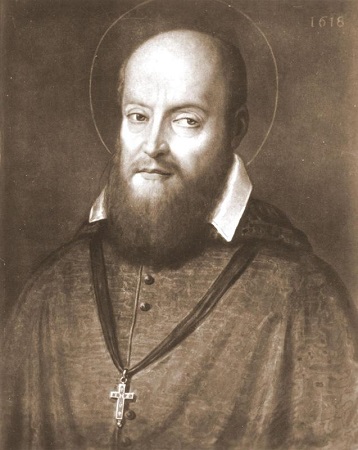
CHAPTER VII
The Second Purification, From All Sinful Affections
All the children of Israel went forth from the land of Egypt, but not all went forth heartily, and so, when wandering in the desert, some of them sighed after the leeks and onions,--the fleshpots of Egypt. Even so there are penitents who forsake sin, yet without forsaking their sinful affections; that is to say, they intend to sin no more, but it goes sorely against them to abstain from the pleasures of sin;--they formally renounce and forsake sinful acts, but they turn back many a fond lingering look to what they have left, like Lot's wife as she fled from Sodom. They are like a sick man who abstains from eating melon when the doctor says it would kill him, but who all the while longs for it, talks about it, bargains when he may have it, would at least like just to sniff the perfume, and thinks those who are free to eat of it very fortunate. And so these weak cowardly penitents abstain awhile from sin, but reluctantly;-- they would fain be able to sin without incurring damnation;--they talk with a lingering taste of their sinful deeds, and envy those who are yet indulging in the like. Thus a man who has meditated some revenge gives it up in confession, but soon after he is to be found talking about the quarrel, averring that but for the fear of God he would do this or that; complaining that it is hard to keep the Divine rule of forgiveness; would to God it were lawful to avenge one's self! Who can fail to see that even if this poor man is not actually committing sin, he is altogether bound with the affections thereof, and although he may have come out of Egypt, he yet hungers after it, and longs for the leeks and onions he was wont to feed upon there! It is the same with the woman who, though she has given up her life of sin, yet takes delight in being sought after and admired. Alas! of a truth, all such are in great peril.
Be sure, my child, that if you seek to lead a devout life, you must not merely forsake sin; but you must further cleanse your heart from all affections pertaining to sin; for, to say nothing of the danger of a relapse, these wretched affections will perpetually enfeeble your mind, and clog it, so that you will be unable to be diligent, ready and frequent in good works, wherein nevertheless lies the very essence of all true devotion. Souls which, in spite of having forsaken sin, yet retain such likings and longings, remind us of those persons who, without being actually ill, are pale and sickly, languid in all they do, eating without appetite, sleeping without refreshment, laughing without mirth, dragging themselves about rather than walking briskly. Such souls as I have described lose all the grace of their good deeds, which are probably few and feeble, through their spiritual languor.
Saints from East and West
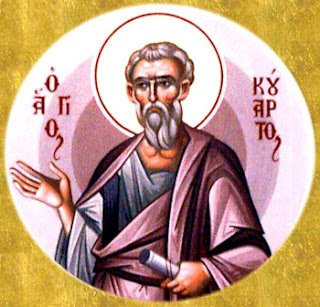
September 21 - Saint Quadratus Of The Seventy.
The Holy Disciple from the Seventy, Quadratus, preached the Word of God at Athens and at Magnezia (the eastern peninsula of Thessaly), and was bishop of Athens. He converted many pagans to the true faith in Christ the Saviour.
In the year 126 the Disciple Quadratus wrote an Apologia in defence of Christianity. Presented by him to the emperor Adrian (117-138), the Apologia thus affected the persecution of Christians, since the emperor issued a decree prescribing not to convict anyone without proof. This Apologia was known in the fourth century to the historian Eusebius. At the present time only part of this Apologia is known, quoted by Eusebius: "The deeds of our Saviour were always witnessed, because they were true. The healings by Him and the raisings-up from the dead were visible not only when they were healed and raised up, but always. They lived not only during the existence of the Saviour upon the earth, but they remained alive sufficiently long also after His departure; some indeed have survived to our present time."
His preaching aroused the hatred of unswayable pagans. One time an angry mob fell upon the disciple to pelt him with stones. Preserved by God, the Disciple Quadratus remained alive, and they threw him into prison, where he died from starvation. His holy body was buried in Magnezia.
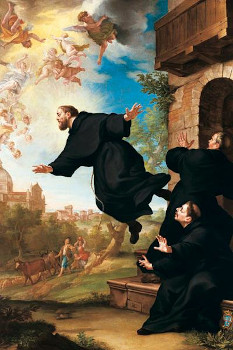
September 18 - Saint Joseph of Cupertino
Joseph Desa was born June 17, 1603, at Cupertino, a small village between Brindisi and Otranto. His parents were poor and unfortunate. Joseph himself was born in a shed at the back of the house, because his father, a carpenter, was unable to pay his debts and the home was being sold up. His childhood was unhappy. His widowed mother looked on him as a nuisance and a burden, and treated him with great severity, and he developed an extreme absentmindedness and inertia. He would forget his meals, and when reminded of them say simply, "I forgot," and wander open-mouthed in an aimless way about the village so that he earned the nick-name of "Boccaperta," the gaper. He had a hot temper, which made him more unpopular, but was exemplary and even precocious in his religious duties. When the time came for him to try and earn his own living, Joseph was bound apprentice to a shoemaker, which trade he applied himself to for some time, but without any success.
When he was seventeen he presented himself to be received amongst the Conventual Franciscans, but they refused to have him. Then he went to the Capuchins, and they took him as a lay-brother; but after eight months he was dismissed as unequal to the duties of the order: his clumsiness and preoccupation made him an apparently impossible subject, for he dropped piles of plates and dishes on the refectory floor, forgot to do things he was told, and could not be trusted even to make up the kitchen fire. Joseph then turned for help to a wealthy uncle, who curtly refused to aid an obvious good-for-nothing, and the young man returned home in despair and misery. His mother was not at all pleased to see him on her hands again and used her influence with her brother, a Conventual Franciscan, to have him accepted by the friars of his order at Grottella as a servant. He was given a tertiary habit and put to work in the stables. Now a change seems to have come over Joseph; at any rate he was more successful in his duties, and his humility, his sweetness, his love of mortification and penance gained him so much regard that in 1625 it was resolved he should be admitted amongst the religious of the choir, that he might qualify himself for holy orders.
Joseph therefore began his novitiate, and his virtues rendered him an object of admiration; but his lack of progress in studies was also remarked. Try as he would, the extent of his human accomplishments was to read badly and to write worse. He had no gift of eloquence or for exposition, the one text on which he had something to say being, "Blessed is the womb that bore thee." When he came up for examination for the diaconate the bishop opened the gospels at random and his eye fell on that text: he asked Brother Joseph to expound it, which he did well. When it was a question of the priesthood, the first candidates were so satisfactory that the remainder, Joseph among them, were passed without examination.
From the time of his ordination St Joseph's life was one long succession of ecstasies, miracles of healing and supernatural happenings on a scale not paralleled in the reasonably authenticated life of any other saint. Anything that in any way could be particularly referred to God or the mysteries of religion was liable to ravish him from his senses and make him oblivious to what was going on around him; the absent-mindedness and abstraction of his childhood now had an end and a purpose clearly seen. Especially during Mass or the Divine Office he would be lifted off his feet in rapture. During the seventeen years he remained at Grottella over seventy occasions are recorded of his levitation, the most marvellous being when the friars were building a calvary. The middle cross of the group was thirty-six feet high and correspondingly heavy, defying the efforts of ten men to lift it. St Joseph is said to have "flown" seventy yards from the door of the house to the cross, picked it up in his arms as if it were a straw, and deposited it in its place. This staggering feat is not attested by an eye-witness, and, in common with most of his earlier marvels, was recorded only after his death, when plenty of time had elapsed in which events could be exaggerated and legends arise. But, whatever their exact nature and extent, the daily life of Saint Joseph was surrounded by such disturbing phenomena that for thirty-five years he was not allowed to celebrate Mass in public, to keep choir, to take his meals with his brethren, or to attend processions and other public functions.
In 1653, for reasons which are not known, the Inquisition of Perugia was instructed to remove Saint Joseph from the care of his own order and put him in charge of Capuchins at a lonely friary among the hills of Pietrarossa, where he was to live in the strictest seclusion. "Have I got to go to prison then?" he asked, and departed at once - leaving his hat, his cloak, his breviary and his spectacles hehind him. To prison, in effect, he had gone. He was not allowed to leave the convent enclosure, to speak to anyone but the friars, to write or to receive letters; he was completely cut off from the world. Apart from wondering why he should be sundered from his fellow Conventuals and treated like a criminal, this life must have been particularly satisfactory to Saint Joseph. But soon his whereabouts was discovered and pilgrims flocked to the place; whereupon he was spirited away to lead the same sort of life with the Capuchins of Fossombrone. The rest of his life was spent like this. When in 1655 the chapter general of the Conventual Franciscans asked for the return of their saint to Assisi, Pope Alexander VI I replied that one Saint Francis at Assisi was enough, but in 1657 he was allowed to go to the Conventual house at Osimo. Here the seclusion was, however, even more strict, and only selected religious were allowed to visit him in his cell. But all this time, and till the end, supernatural manifestations were his daily portion: he was in effect deserted by man but God was ever more clearly with him. He fell sick on August 10, 1663, and knew that his end was at hand; five weeks later he died, at the age of sixty. He was canonized in 1767.

Advice You Can Bank On
A Catholic Perspective On Finances
Be Fruitful and Multiply
Genesis 1:29 says, “And God said: Behold I have given you every herb bearing seed upon the earth, and all trees that have in themselves seed of their own kind…”
In this age of rampant inflation, gas prices at an all-time high and general unease about our economy and where it might be going, we should be taking this passage quite seriously.
God has given us every seed; we just need to plant them.
Perhaps you garden a bit already, or perhaps you have never tried it or think you have a black thumb. Our Lord instructs us again in Luke 17:6, “And the Lord said: If you had faith like to a grain of mustard seed, you might say to this mulberry tree, Be thou rooted up, and be thou transplanted into the sea: and it would obey you.”
In this instruction, our faith (or lack thereof) is compared to that of a mustard seed. As we all know, mustard seeds are very small but grow into very large trees. We can accomplish much by starting small. Even if the space we have is small, we can put it to good use. And even if we have never gardened before, we can surely give it a try.
Gardening is an excellent way to curb the bottom line at the grocery store, and itself is a calling of mankind since our creation. God placed Adam in the garden to work it and take care of it. He then created Eve to help Adam. It seems only natural that we do the same.
Seeds are relatively inexpensive, and soil is a natural part (of most of our) habitats. Even in extreme urban living conditions there are solutions to creating a garden on a balcony, patio, or a kitchen counter. For the price of a little more than one head of lettuce, you could have many heads of lettuce. A recent price check for a pack of lettuce seeds at The Home Depot, for example, is $2.49. Iceberg lettuce at the grocery store is $1.99.
Perhaps our excuse is lack of time, or that we don’t know much about gardening. We are not called to make excuses, but to work. It is a gift from God that we see the good in our labor: And I have known that there was no better thing than to rejoice, and to do well in this life. For every man that eateth and drinketh, and seeth good of his labour, this is the gift of God. (Ecclesiastes 3:12-13)
We, ourselves, have been off again and on again about gardening, but we’ve always enjoyed it. My husband recently made a space in the yard to plant seeds, and I took immediately to doing so. I go out in the morning and water and some have already sprouted. It’s exciting to watch.
The seed planting didn’t take much time itself, and watering is a good time to reflect on the day to come and to have a few minutes of peace before the day gets going. It’s a rare occurrence to be able to meditate on anything that may be on my mind, and truthfully, it’s welcome. For those of us that work from home or in an office setting without much time outside, or exercise in general, it’s perfect. It’s not so daunting that you’re exhausted afterwards, and in the end, your hard work will pay off. There is nothing to lose!
We haven’t set a goal for any type of offset amount between the garden and the grocery store, but as Genesis 1:28 says, “And God blessed them, saying: Increase and multiply, and fill the earth, and subdue it, and rule over the fishes of the sea, and the fowls of the air, and all living creatures that move upon the earth.”
Start small, and abundance will follow, even if it’s one mustard seed.

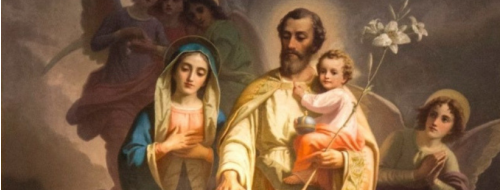 Family Matters
Family Matters
From our article from June 2022 Olive Tree, we saw, in verses five and six of Psalms 78, a beautiful picture of four generations.
In the article from July 2022, the genealogy listed in the book of Matthew described an amazing line of godly men. When we were studying these men, I hope you began to understand why David was a man after God's own heart. The seeds were being planted for two hundred years.
In the article from August 2022, We took a look at another generation of Men
-
Abraham
-
Isaac
-
Jacob
-
Joseph
-
Ephraim
This month we will look at another generation of Men. Four Generations to be exact.
Amram: One of the sons of Levi, Amram was the father of Moses, Aaron, and Miriam. By faith he discerned God's call on his son Moses. He and his wife prayed and saw God preserve their son with a miracle.
Aaron: The second son of Amram, Aaron was chosen by God to be the high priest in Israel. He had two godly sons, Eleazer and Ithamar.
Eleazer: This son took his father's place as high priest. The record of his life shows the impact that his father had on him. God gave him a son whose name was Phinehas.
Phinehas: This man put away evil in Israel and received a blessing from God for his generations to come. He also followed his father as the next high priest. The record of his life shows that he was a faithful servant of God, serving his generation.
All of theses accounts are Biblical examples of how God's Word works. “The statutes of the Lord are right, [they works] rejoicing the heart” (Psalms 19:8a). We need to take fast hold on these words for our own lives, and for our families. Let the words preached be mixed with faith and bring much profit to us who hear them. How would you like to receive a vision, a rhema from God that would enable you to claim generations of godly children? I believe with all my heart, that you can do that. I believe that it is within your grasp. God, who is no respecter of persons, is able to make all grace abound toward you, and bring it to pass. I will show you as we go along, that it is possible for you even you, to so labor together with God that generations are affected.
Some may say, “The Lord may return before we get all that done.” This is true. We never know when He may split the eastern sky, but, should we neglect our children because the time is sort? God forbid! Surely the bride will bring her children along to the wedding. Even though the time may be short, God wants us to have a vision! God wants uis to see the generations to come! Remember. A heritage is that which is passed down from one generation to the next. We are talking about passing down a spiritual heritage of godliness from one generation to the next, and on to the next. This is a godly heritage.
Prayer
Holy Father, we thank Thee for the inspired records of ancient days. Our hearts are stirred by what the men of old did and what they received. Grant to us what they had. Yea, give us more, for we know we live under the blessings of the New Covenant. Increase our vision and expand our horizons to see the generations that will surely come from us with Your most Holy Spirit, that we may see our children, marching toward Thee all their days.
From the history of the papal elections, heresies and schism
1) The right of designation: The living Pope appointed his successor. An example is the Apostle Peter, who ordained his successors Clement, Linus and Cletus as the Bishops of Rome. This practice was restored by Pope Symmachus in 499. The designation was practised during the election of Felix IV (526-530), Boniface II (530-532), Vigilius (537-555).
2) The Pope was elected by the clergy and the people: In his Letter to Antonianus, St Cyprian writes about Pope Cornelius: “He was elected Pope by the testimony of most of the clergy, by the vote of the people, with the consent of aged priests and of good men.” So the whole Christian community took part in the election. This was the prevailing practice in the first three centuries.
3) The Pope was chosen by the Theophylact family: The papacy was left entirely at the mercy of the Roman patrician Marozia. John X (914-928), Leo VI (928), Stephen VII (928-931) and John XI (931-935), who was Marozia’s own son, owe their election to her. Her second son Alberic II (932-954) later also named several Popes. He saw to it that his depraved 18-year-old son Octavian was elected Pope, adopting the title of John XII (955-964).
4) The Pope is elected by cardinals: Nicholas II issued the papal election decree in 1059. The cardinal bishops were to consult each other first and select a suitable candidate. Then they had to invite the clergy to decide and finally seek the consent of the common Roman people. So it was not only the cardinals who voted, but they also needed the consent of the clergy and the people.
5) The Pope was proclaimed by the people
This was how Gregory VII (1073-1085) was elected. At the funeral of the previous Pope, the crowd shouted, “Let Hildebrand be our Pope!” There was such strong pressure from the people that, contrary to ecclesiastical law and customs, this monk became Pope.
A similar election took place in 236. In the temple where the papal election was to take place, a dove suddenly descended from heaven on Fabian’s head. All the people exclaimed enthusiastically and with one voice, “Worthy (axios)!” The people seized this Christian and installed him as Bishop of Rome.
6) The Pope is elected by cardinals but in fact under the influence of powerful dynasties
At a later time, the papal election was strongly influenced by the powerful Colonna and Orsini families.
Today, the entire Bergoglian Vatican is ruled by Masons. These men in aprons with the emblem of the compass use various ecclesiastical procedures to pursue their goals, including the election of a Pope.
7) Extraordinary election
Extraordinary conditions require an extraordinary method of election to enable the election of a true Pope instead of a heretic or a person subject to the system of Masonic domination.
The current regulations, which stipulate that only a cardinal can be elected Pope, are not a dogma of the Church.
It is also important to know that the Church is built on the foundation of the apostles and prophets (Eph 2:20). When the human structure starts the process of self-destruction, God in His providence intervenes in the papal election in an unusual way. This is what happened on 14 October 2019, when the Eastern Church celebrates the Feast of the Protecting Veil of the Mother of God. After mature deliberation and prayers, eight bishops of the Eastern rite elected and proclaimed a valid Pope. In today’s situation, the entire morally corrupt Vatican system no longer offered any hope of choosing a true Pope, and Francis Bergoglio is an invalid Pope for his heresies. The elected Archbishop has not yet publicly accepted the election, but has not rejected it either.
Schism
Church history has seen a number of schisms. Let us have a look at some of them:
1) The Acacian Schism, due to the heresy of Monophysitism, since the time of Pope Felix II (483-492)
2) The Great Schism of 1054 and the emergence of Orthodoxy
3) The Protestant Schism of 1521 and the rise of Protestantism
A distinction must be made between a schismatic who has separated himself from the visible Pope and a heretic who has separated himself from Christ. A schismatic may be saved, but a hardened heretic cannot.
The Second Vatican Council, with its coded heresies, has set Catholics on a false path that does not lead to salvation. Bergoglio’s synodal journey consequently leads to the foundation of one New Age anti-Church – the synagogue of Satan. It will create a false unity among pagans, satanists and Catholic and non-Catholic apostates. All those who do not love the truth will unite in this anti-Church.
On the other hand, all those who seek the truth, be they Catholics or non-Catholics, are united in Christ. They are opposed to the system of globalization, gender ideology, human digitization, dangerous vaccination, chipping and satanization.
Legitimate and illegitimate Popes
The first illegitimate Pope was the martyr Hippolytus (217-235), and after him there were Novatian (251-258) and Ursinus (366-367). A special period of history is the dual papacy. One Pope was in Rome, the other in Avignon. Although Christianity had experienced the struggle between Popes and Antipopes several times before, the disputes never lasted so long and it never was so unclear where and who the true Pope was. Both of them had the support of well-known saints. Europe was divided; some recognized one, some the other. Ironically, it was not until the heresy of Conciliarism was addressed at the Council of Constance (1414-1418) that the schism was overcome by the election of Martin V.
Why did the divisions occur? They were a call to repentance, especially due to the worldly life of prelates. However, they did not repent. It ultimately led to the Protestant schism initiated by Martin Luther a hundred years after the period of three Popes.
At present, we find ourselves in an absurd situation. Today, to separate from Bergoglio, who occupies the papal throne, is not a schism, because so-called Francis is an archheretic. He does not want to leave office, so a true Catholic faithful to Christ must leave Bergoglio and Bergoglianism.
From the point of view of history, we also evaluate the current Church. It has never been the case throughout history that the head of the Church systematically destroys the basic pillars of faith and morality and converts Catholics en masse, under the guise of obedience, not to Orthodoxy or Protestantism, but to Satanism! It involves the privileging of gender ideology, LGBTQ agenda, Pachamama idolatry and same-sex marriage. This is no longer the true Catholic Vatican; this is the spiritual Babylon, the harlot of the antichrist! It consistently eliminates the last remnants of the true faith, which is the condition of salvation.
The Church of Christ cannot be headed by an archheretic and his successors, although the Masonic brothers would easily ensure their election according to Bergoglio’s motto – fratelli tutti! They already de facto control the Vatican and the papal elections. After Bergoglio leaves, there is either option A, i.e. Bergoglio’s successor following in his footsteps, or option B, i.e. an outwardly true Pope who will legalize Bergoglio’s decay. But there is also another option. Scaring the faithful with the thought of schism is nothing else than manipulating them into being afraid to separate from apostasy. Man’s goal is to save the soul, not to remain in a structure which has visibly betrayed Christ and His teachings and which is under God’s curse, anathema (see Gal 1:8-9). If the option is realized in an extraordinary way with a Pope who will oppose the heresies of Bergoglianism, sincere Catholics will have a way out. But they must be ready for persecution and martyrdom.
The American continent offers great hope, because Europe has already been poisoned by German heretics who have lost their minds and are promoting sodomite marriage. This German religious fascism has also promoted the heresies of the Second Vatican Council. We are now reaping the fruits.
We call on the Catholic bishops and priests of the United States and all the states of Central and South America: Strive for a true reform! Separate yourselves from Bergoglio and his apostate synodal journey and recognize a true Pope who will ensure a revival process on the American continent. The revival will then extend to other continents.
Sincere Catholics are in danger of succumbing to the demagoguery of Auxiliary Bishop Schneider, who ostensibly condemns heresies but promotes the heretic Bergoglio as the visible head of the Church. He influences especially the priests of the Society of St Pius X. In reality, however, he is in direct conflict with its founder, Archbishop Marcel Lefebvre, who was the first to clearly oppose the heretical Council. Vatican II has also been clearly condemned by the former US nuncio, Carlo Maria Viganò. Schneider, by contrast, speaks only of cosmetic changes, but adamantly defends the Council.
What did Abp Lefebvre say about the Council? “We refuse and have always refused to follow the Rome of neo-Modernist tendencies which were clearly evident in the Second Vatican Council and, after the Council, in all the reforms which issued from it.”
We draw on history and the current situation, and call on all sincere Catholics to pray. Let us pray the Holy Rosary daily, if possible from 8 to 9pm. Let us pray in unity for the intention of the true Catholic Pope and for the bishops of the American continent to take a step of faith to save the Church.
+ Elijah
Patriarch of the Byzantine Catholic Patriarchate
+ Methodius OSBMr + Timothy OSBMr
Secretary Bishops


Books to feed your faith!
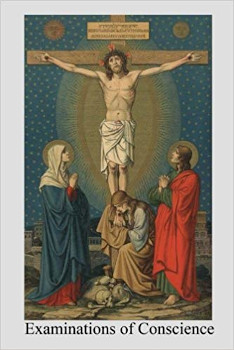
$14.95
This work contains several examinations of conscience from Catholic classic books. It also contains Saint Alphonsus' instruction on Confession from his Catechism. Further notes are contained on modern sins and on conversion. One examination of conscience distinguishes between mortal and venial sins. In preparing for the Sacrament of Confession it is easy to get into a rut, using the same examination of conscience for every Confession. These examinations are from various sources and are provided to help us shake up our spiritual life. By varying our routine, we can more easily identify our sins and bring them to the tribunal of Penance where we can present them before the Divine Physician and His human representative, the duly authorized priest. In this way our confessor can prescribe the remedies for our sins, so that we can heed the advice of Jesus: “Go now and sin no more, lest some worse thing happen to you.” (John 5:14) Since these come from timeless older works, they have been updated by this author to include the sins that are so easily committed with modern technology, such as radio, television, moves, the computer and the internet. We hope all will benefit from the sage advice contained in this book.

Spiritual Despondency and Temptations
$15.95
In this book you will therefore find wholesome instruction, great knowledge of the interior life, and of the human heart, - the result of years of experience in the direction of souls. The subject is at once both highly important and very difficult. The Author has not confined himself to general principles and vague maxims, but he has entered into the very sanctuary of the soul, into its secret folds and most intricate windings. The thread of Reason, the light of Faith, and the torch of Experience have led him safely through that labyrinth where so many lose themselves, rashly attempting to explore it without the proper guides. A few principles, presented under different aspects, solve all difficulties, throw light upon doubts that are ever recurring, expose all the subterfuges of self-love, sloth, and cowardice, refute their objections, and silence their excuses. The Author has followed the most useful plan for works of this kind. He adopts the method of reasoning - and his reasoning is as clear as it is solid. The greater number of persons who profess piety prefer appeals to their imagination and to their heart, rather than to their reason. They like to be excited by lively descriptions, and by tender and touching language; but in so doing, they are seeking a passing gratification rather than a real and permanent benefit. Such descriptions and sentiments soon fade away, but the fruits of conviction are more lasting. Pure reason and true faith never vary; imagination and feeling are incessantly changing according to the different objects which act upon them. It is from indolence that feeling is preferred to reasoning. The greater part of mankind are indolent, and hence there are so few who care to reflect and reason. But one who has an earnest love for virtue and duty, who is anxious about his salvation, should not shrink from the mental effort which the exercise of reason and of faith requires. We should remember that no sincere and permanent resolution can be taken without a conviction of its necessity. This is according to the natural order of reason, and to the economy of grace. The understanding must be enlightened before the will can be moved. This work appears to be specially intended for the instruction of persons living in religious communities, and for seculars aiming at perfection; but in this age of indifference and discouragement all who profess the true faith may here find no little help to undeceive them in their errors, and to strengthen them against the wiles of self-love. We venture to hope that even Directors of consciences may discover therein that which will increase their light, and supply for any want of experience in their difficult and dangerous ministry.
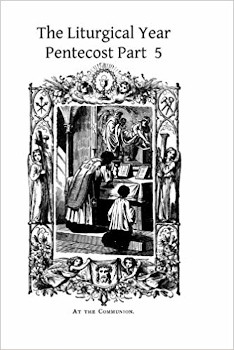
The Liturgical Year: Pentecost Part 5 (Volume 14)
$19.95
This is a fifteen volume set, which is being brought back into print for the edification of the Faithful. Anyone who wishes to appreciate the timeless Tridentine Mass and liturgy will find this set a valuable aid in that endeavor. Dom Gueranger has produced a most excellent work, which began the liturgical movement. We pray that this set of books will bring many more to a true appreciation of the Latin Mass and the Divine Office of the Catholic Church. At one time, under the impulse of that Spirit, which animated the admirable Psalmist and the Prophets, she takes the subject of her canticles from the Books of the Old Testament; at another, showing herself to be the daughter and sister of the holy Apostles, she intones the canticles written in the Books of the New Covenant; and finally, remembering that she, too, has had given to her the trumpet and harp, she at times gives way to the Spirit which animates her, and sings her own new canticle. From these three sources comes the divine element which we call the Liturgy. The Prayer of the Church is, therefore, the most pleasing to the ear and heart of God, and therefore the most efficacious of all prayers. Happy, then, is he who prays with the Church, and unites his own petitions with those of this Spouse, who is so dear to her Lord, that he gives her all she asks. It was for this reason that our Blessed Saviour taught us to say our Father, and not my Father; give us, forgive us, deliver us, and not give me, forgive me, deliver me. Hence, we find that, for upwards of a thousand years, the Church, who prays in her temples seven times in the day, and once again during the night, did not pray alone. The people kept her company, and fed themselves with delight on the manna which is hidden under the words and mysteries of the divine Liturgy. Thus initiated into the sacred Cycle of the mysteries of the Christian year, the faithful, attentive to the teachings of the Spirit, came to know the secrets of eternal life ; and, without any further preparation, a Christian was not unfrequently chosen by the Bishops to be a Priest, or even a Bishop, that he might go and pour out on the people the treasures of wisdom and love, which he had drunk in at the very fountain-head. For whilst Prayer said in union with the Church is the light of the understanding, it is the fire of divine love for the heart. The Christian soul neither needs nor wishes to avoid the company of the Church, when she would converse with God, and praise his greatness and his mercy. She knows that the company of the Spouse of Christ could not be a distraction to her. Is not the soul herself a part of this Church, which is the Spouse? Has not Jesus Christ said: Father, may they be one, as we also are one? and, when many are gathered in his name, does not this same Saviour assure us that he is in the midst of them? The soul, therefore, may converse freely with her God, who tells her that he is so near her; she may sing praise, as David did, in the sight of the Angels, whose eternal prayer blends with the prayer which the Church utters in time.
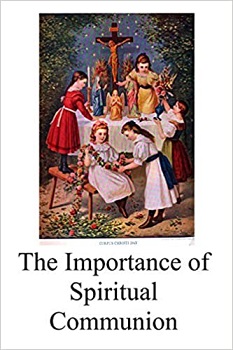
The Importance of Spiritual Communion
Kindle $2.99 / Paperback $5.99
If we cannot receive Holy Communion actually, then let us do so spiritually. These prayers and instructions have been gathered from the Saints and other venerated spiritual writers. Spiritual Communion has been a part of the spiritual life for decades. Growing up I was instructed to make a Spiritual Communion, when I could not go to Communion such as when I assisted at a second Mass. The same is true if one finds oneself at Mass, but not fasting. There are times coming, when it will be difficult, if not impossible to assist at the Holy Sacrifice of the Mass. We should be prepared for such times.
For More Good Traditional Catholic Books:

Bertha's Easy Chicken Pot Pie

Ingredients:
1 recipe pastry for a 9 inch double crust pie
1 carrot, chopped
1 head fresh broccoli, chopped
2 boneless chicken breast halves, cooked and chopped
1 (10.75 ounce) can condensed cream of chicken soup
⅔ cup milk
1 cup shredded Cheddar cheese
½ teaspoon salt
Directions:
Preheat oven to 425 degrees F (220 degrees C).
Steam carrots and broccoli in a covered pot for 3 minutes, until slightly tender but still firm.
In a large bowl, mix together carrots, broccoli, chicken, soup, milk, cheese, and salt. Spoon mixture into pastry-lined 9 inch pie pan and cover with top crust. Seal edges and cut steam vents in top.
Bake in preheated oven for 30 minutes, until golden brown.
Mother's Own Apple Fritters

Ingredients:1 quart vegetable oil for deep-frying
1 1/2 cups all-purpose flour
1 tablespoon white sugar
2 teaspoons baking powder
1/2 teaspoon salt
2/3 cup milk
2 eggs, beaten
1 tablespoon vegetable oil
3 cups apples - peeled, cored and chopped
1 cup cinnamon sugar
Directions:
Heat the oil in a deep-fryer or electric skillet to 375 degrees F (190 degrees C).
In a large bowl, stir together the flour, sugar, baking powder and salt. Pour in the milk, eggs and oil and stir until well blended. Mix in apples until they are evenly distributed.
Drop spoonfuls of the batter into the hot oil and fry until golden on both sides, about 5 minutes depending on the size. Fry in smaller batches so they are not crowded. Remove from the hot oil using a slotted spoon and drain briefly on paper towels. Toss with cinnamon sugar while still warm.
Video sermons and instructions: Timeless timely truths for living the Faith
Funeral Sermon For My Friend
Birthday of the Blessed Virgin Mary
Getting the Gospel Right
Ep 6 The Cost of Being A Disciple Of Christ

Encouragement for Today
Therefore encourage one another and build one another up.... I Thessalonians 5:11
We believe that through our assorted podcasts, Vlogs, audio downloads and devotional blogs, you will find an assorted Treasure Chest of...
- Sermons
- Classic Catholic Audio Books.
- Devotionals
- Scripture Studies
- Catechism Lessons
- Old-Time Christian radio programs
- Catholic Videos
...that will be a help in your faithful walk with the Lord.
LEARN MORE AT THE ENCOURAGEMENT FOR TODAY WEBSITE: https://www.encouragementfortoday.com
Truths From Genesis

Why 6,000 Years?
The Bible records the creation of the world in Genesis, and then gives us all sorts of information that enables us to add up dates to find out when God made the world. For instance, we are told that God made everything in six days. (we will discuss in a different article in detail that these were ordinary days just like we have today). We are then told that the first parents were made on day six, and in passages in the Bible we are told when people were born, and when they died and so on, just like we read in these verses that are part of the history given in Genesis 5 leading up to a man called Noah.:
When Adam had lived 130 years, he fathered a son in his own likeness, after his image, and named him Seth. The days of Adam after he fathered Seth were 800 years; and he had other sons and daughters. Thus all the days that Adam lived were 930 years, and he died.
When Seth had lived 105 years, he fathered Enosh. Seth lived after he fathered Enosh 807 years and had other sons and daughters. Thus all the days of Seth were 912 years, and he died.
When Enosh had lived 90 years, he fathered Kenan. Enosh lived after he fathered Kenan 815 years and had other sons and daughters. Thus all the days of Enosh were 905 years, and he died.
When Kenan had lived 70 years, he fathered Mahalalel. Kenan lived after he fathered Mahalalel 840 years and had other sons and daughters. Thus all the days of Kenan were 910 years, and he died.
When Mahalalel had lived 65 years, he fathered Jared. Mahalalel lived after he fathered Jared 830 years and had other sons and daughters. Thus all the days of Mahalalel were 895 years, and he died.
When Jared had lived 162 years, he fathered Enoch. Jared lived after he fathered Enoch 800 years and had other sons and daughters. Genesis 5:2-19
You can read the entire genealogy from Adam to Noah and his sons in Genesis 5:1-32. You can see that this list tells us when people were born and when they died.
Many great scholars who have spent a lifetime studying the Bible have added up all such dates from these lists and other events and come to the conclusion that God created the world about 4000 years before Jesus was born as a babe in a manger. I am writing this article in the year 2022 A.D., which means the earth must be about 6,000 years old.

Catechism Catch-Up

How Important Is The Fear Of The Lord?
The rewards of developing the fear of the Lord are emphasized throughout Scripture. In fact, all the things a person would hope to find in the proverbial pot of gold come with humility and the fear of the Lord. Proverbs 22:4 states that “ The fruit of humility and the fear of the Lord, are riches (honor) and glory and life.”
Scriptural rewards for fearing the Lord:
- Strength to turn away from evil
“By mercy and truth iniquity is redeemed: and by the fear of the Lord men depart from evil.” (Proverbs 16:6).
- Knowledge
“The fear of the Lord is the beginning of knowledge. Fools despise wisdom and instruction.” (Proverbs 1:7).
- Wisdom
“The fear of the Lord is the beginning of wisdom: and the knowledge of the holy is understanding” (Proverbs 9:10).
- Prolonged life
“The fear of the Lord prolongeth days: but the years of the wicked shall be shortened” (Proverbs 10:27).
- A fountain of life
“The fear of the Lord is a fountain of life, to depart from the snares of death” (Proverbs 14:27).
- The basis for contentment
“Better is a little with the fear of the Lord
than great treasure and trouble with it.” (Proverbs 15:16). - The instruction of wisdom
“The fear of the Lord is the lesson of wisdom: and humility goeth before honor.” (Proverbs 15:33).
- Healing and refreshment
“Be not wise in thine own eyes: fear the Lord, and depart from evil. It shall be health to thy navel, and marrow to thy bones.” (Proverbs 3:7–8).
- Worship
“But as for me, I will come into thy house in the multitude of thy mercy: and in thy fear will I worship toward thy holy temple” (Psalm 5:7).
- God’s faithful provision
“O fear the Lord, ye his saints: for there is no want to them that fear him” (Psalm 34:9). “He hath given meat unto them that fear him: he will ever be mindful of his covenant” (Psalm 111:5).
- Access to God’s salvation
“Surely his salvation is nigh them that fear him; that glory may dwell in our land” (Psalm 85:9).
- Strong confidence and refuge
“In the fear of the Lord is strong confidence: and his children shall have hope and a place of refuge” (Proverbs 14:26).
- A satisfying life
“The fear of the Lord is unto life: and he shall abide satisfied without being visited with evil.” (Proverbs 19:23).
- The secrets of the Lord
“The secret of the Lord is with them that fear him; and he will show them his covenant” (Psalm 25:14).
- Experiences of God’s goodness
“Oh how great is thy goodness, which thou hast laid up for them that fear thee; which thou hast wrought for them that trust in thee before the sons of men!” (Psalm 31:19).
- God’s watchful care and provision
“Behold, the eye of the Lord is upon them that fear him, upon them that hope in his mercy; to deliver their soul from death, and to keep them alive in famine” (Psalm 33:18–19).
- Deliverance from trouble
“The angel of the Lord encampeth round about them that fear him, and delivereth them” (Psalm 34:7).
- God’s mercy
“For as the heaven is high above the earth, so great is his mercy toward them that fear him” (Psalm 103:11).
- The Lord’s fatherly pity
“Like as a father pitieth his children, so the Lord pitieth them that fear him” (Psalm 103:13).
- Bringing pleasure to God
“The Lord taketh pleasure in them that fear him, in those that hope in his mercy” (Psalm 147:11).
- Becoming God’s special treasure
“Then they that feared the Lord spoke every one with his neighbour often: and the Lord gave ear, and heard it: and a book of remembrance was written before him for them that fear the Lord, and think on his name. And they shall be my treasured possession, saith the Lord of hosts, in the day that I do judgment...” (Malachi 3:16–17).
- To be taught the way of the Lord
“What man is he that feareth the Lord? him shall he teach in the way that he shall choose” (Psalm 25:12).
- The application of sanctification
“Having therefore these promises, dearly beloved, let us cleanse ourselves from all defilement of the flesh and of the spirit, bringing sanctification to completion” (II Corinthians 7:1).
- Scriptural submission to one another
“Submitting yourselves one to another in the fear of God” (Ephesians 5:21).
- The fulfillment of desires
“He will fulfill the desire of them that fear him: he also will hear their cry, and will save them” (Psalm 145:19).
In light of such abundant promises, we should earnestly seek to develop the fear of the Lord. We would be wise to pray along with the psalmist David, “Teach me thy way, O Lord; I will walk in thy truth: unite my heart to fear thy name” (Psalm 86:11).
READ MORE FROM THE TRADITIONAL CATECHISM AT THE WEBSITE: https://www.traditionalcatechism.com
Living Catholic:
Discerning Gods Direction In Courtship Through Questions

Each courtship will be unique, because people and situations are unique. However, in every courtship, both individuals and families should seek God’s direction through:
- Insights from the Word of God.
- Fervent prayer.
- The Godly counsel of your Priest.
- Wise discernment of direction through circumstances.
One tool to use to gain discernment into your unique situation is to ask insightful questions. From the days of the Greek philosophers, the art of asking appropriate questions as a teaching strategy was regarded as a mark of a master teacher. Jesus is the ultimate example of a wonderful teacher. Reading the Gospels gives us insight into the methods and strategies He used to teach, and often He skillfully asked insightful questions.
The Lord Jesus Christ’s questions required His listeners to reason and make judgments in order to formulate answers. As they expressed those answers, frequently their false reasoning or even the wickedness of their hearts was exposed, and the truth was revealed. Ask the Lord for guidance as you ask insightful questions to discern His direction for a courtship.
Ask Questions Before Entering a Courtship Relationship
Following are examples of questions that have been helpful to others and should be considered by both the man and the woman in preparation for the decision to pursue courtship. Ask these questions of yourself and use them as discussion points in the process of the courtship.
General Questions About Marriage
- Am I committed to lifelong marriage?
- Have I ruled out the option of divorce? If, in spite of my objection, I become divorced, have I purposed never to remarry as long as my spouse is living?
- Am I determined to receive the blessing of both sets of parents by entering into marriage only if they offer their wholehearted support?
Questions About Beginning a Courtship
- What clear evidence is there that God is initiating this courtship?
- Do my spirit and God’s Spirit confirm that these indications are valid, or am I merely responding to the promptings of my mind, will, and emotions? “He that trusteth in his own heart is a fool” (Proverbs 28:26).
- Has God given me a specific Scripture (rhema) about this decision? If so, has it been confirmed by two or three additional rhemas? This affirmation follows the principle of II Corinthians 13:1: “In the mouth of two or three witnesses shall every word stand.”
- Are there any reasons why I should not pursue courtship and marriage to this person? For example, if the man or woman is an unbeliever, marriage to that person would violate Scripture. (See I Corinthians 6:14.) Likewise, if either person has been married and divorced, and the previous partner is still living, it would not be God’s will for the divorced individual to marry anyone else. “Every one that putteth away his wife, and marrieth another, committeth adultery: and he that marrieth her that is put away from her husband, committeth adultery.” (Luke 16:18). (See also Romans 7:1–3, I Corinthians 7, Malachi 2:11–16, Mark 10:1-12, Matthew 5:27–32, and Matthew 19:1–12.)
- Am I willing to develop better communication skills as we deepen our relationship?
- Am I willing to seek help from God and others in areas in which I am unprepared to be a Godly husband/wife?
Questions Related to the Man’s Role
When God leads a man to pursue courtship, there are questions that he should carefully consider. His answers will provide valuable insight as he seeks to judge his own heart and follow God’s will. “But let a man prove [test, approve, examine] himself … . For if we would judge ourselves, we should not be judged” (I Corinthians 11:28, 31).
- Am I willing to make my role as husband and father my top priority, even above career advancement and financial gain?
- Am I willing to grow in leadership, especially in the area of spiritual leadership?
- Am I able and eager to be a provider for a wife and children?
- Am I willing to honor this woman with my thoughts, attitudes, words, and actions?
As God confirms His direction through the young man’s authorities (which should include his parents, and Godly mentors such as his priest), through rhemas from the Lord, and through prayer, only then should he contact the woman’s father to request permission to court his daughter.
If the woman and her parents are in agreement with the man and his parents that a courtship should be initiated, they should deepen their friendship by spending time together, especially in activities with his family and her family.
Ask Questions During a Courtship Relationship
Marriage partners are to function as a team whose goal is to serve God. As the couple’s relationship progresses, both of them should—as objectively as possible—answer insightful questions about the person he/she is courting to determine the compatibility of their lives and faith.
Questions Related to the Woman’s Role
To help the woman discern if it is the Lord’s will for her to enter into a marriage covenant with the man she is courting, the woman would be wise to ask herself the following questions, in addition to any other questions that the Lord or her parents prompt her to ask.
- Am I willing to become the lifelong helpmate of this man? Can I lovingly set aside my goals for the future and wholeheartedly support his God-given goals for our family?
- Is this man ready to care for a family’s spiritual needs, and can I follow his leadership in this area?
- Has this man carefully considered how he will provide for the basic needs of our family, such as food, clothing, shelter, and transportation?
- Am I willing to honor this man in my thoughts, attitudes, words, and actions?
General Questions to Discern Compatibility
True fulfillment in marriage does not come from the physical relationship, but from the spiritual intimacy that both share with God, Who created them. If this suitability is not an aspect of their relationship, the marriage will be seriously damaged.
Here are some examples of questions that should be asked to help discern compatibility in life and faith. Again, these questions can be asked of both the man and woman and be used as discussion points with the goal of developing a successful, long-term relationship.
- Do you both have a firm belief in God?
- Do you both have a personal faith in Jesus Christ?
- Do you both have a genuine, growing walk with God?
- Do you both accept the Church as your final authority?
- Do you both understand your areas of jurisdiction?
- Do you both know how to function under the protection and direction of God-given authorities?
- Do you both have a regular time of prayer? Does God answer your prayers?
- Do you both have a daily time of reading the Bible?
- Have you agreed on standards for activities?
- Are you in agreement about areas of self-control in marriage?
- Do both of you love and desire to have children?
- Is there agreement about methods of child discipline?
- Will you have full agreement on major purchases?
- Is either of you aware of any hurts or fears that could be obstacles to experiencing a successful marriage?
- Do you both have good relationships with your parents and siblings?
- Do you both demonstrate Godly wisdom in making right decisions?
- Are you both wise and generous with your financial resources?
- Do you both wholeheartedly seek to obey the commands of Christ?
- Do you both have a life message that brings glory to God?
This list is not exhaustive, and these questions should not be used as a sort of checklist to find “the perfect person” but to take a realistic look at who you both are and to discern if you are compatible for the lifelong commitment of marriage. Answers to these questions can provide critical insights into the character of both parties.
As strengths and weaknesses are revealed, the couple should discuss their answers and encourage one another in the Lord. This time will provide the couple with opportunities to humble themselves before the Lord and each other. (See James 4:6–10.) God can use these questions and answers as a channel of His blessing by drawing the couple to Himself and motivating them to ask for more grace. As the man and woman judge their own hearts, humble themselves, and seek the Lord, He will build them up and conform them to the image of Jesus Christ. (See Romans 8:29.)
Using insightful questions to gain wise discernment is a reflection of Christ’s instruction to be wise as serpents and harmless as doves. (See Matthew 10:16.) Choosing a spouse is one of the most important decisions of life, and the relationship should not be entered without seeking God’s guidance.
If one party realizes that marriage is not God’s will and the courtship is ended, it can still be regarded as a successful courtship. After all, God gave direction about the couple’s potential marriage, and that was the purpose of the courtship. Even if the courtship does not lead to marriage, both families can rejoice and thank the Lord for the protection that Biblical courtship provided for everyone involved.
To Learn More Principles For Life Go To: Resources: Principles of Life

Enjoying the Olive Tree? Why not subscribe today? Click here to go to the FREE scubscription page!


- Please pray for the repose of the soul of the Holy Father, Pope Michael.
- Please pray for the success and growth of the new Chrysostom Bible Institute. Check out the wonderful work it is doing and see how you can get involved!
- Your prayers and support are asked in a special way for the newly established House of Prayer.
- Pray especially that the Holy Ghost inspires and helps us prepare spiritual manuals and days of recollection to make available to all.
- Keep in your prayers our Podcast Ministry, a new way to reach out in the missionary work of the Church! We ask for prayers for our other activities world wide. We have made good contacts in the Philippines and Japan and ask prayers that these contacts will bear much fruit for the salvation of souls.
- Be sure to keep St. Helen Catholic Mission in your prayers. Why not go on over to the site now and see what they have to offer and how you might be able to help!
- Also we ask you to keep in prayer our increasing missionary work in the United States and elsewhere.
- Pray for those outside the Church and those who do not know God, that they may see the light of grace and be led safely home to the refuge of the Holy Catholic Church.
- As always, we also ask that you pray for yourself! Never forget your own state of soul. God is calling you to His service in His love. We know that our Lord can count on you to answer.
- We are all praying especially for you, too. May you correspond with every grace of God!
- In what other needs or intentions may we pray for you? Let us know!
- Let us remember that the Church runs on prayer. Without your prayers, God will not work in hearts and souls to bring them to a knowledge of the truth. (I Timothy 2:4)


To Donate online go to:

To Donate by Mail:
Our address is
Vatican in Exile
423 NE Grattan ST
Topeka, Kansas 66616
Make Checks payable to:
Vatican in Exile


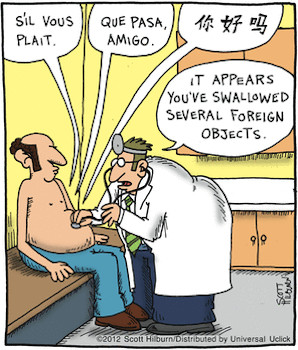



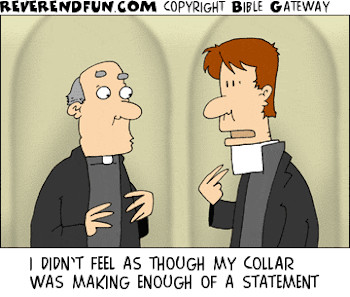











 Follow
Follow


